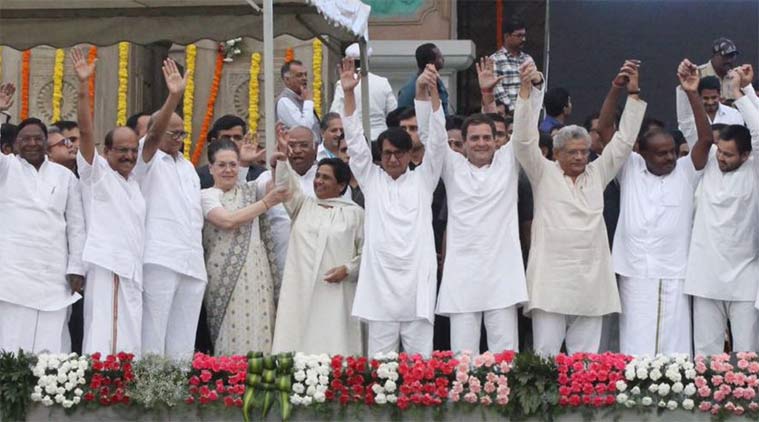Friendship Day 2018: When friends have turned foes in politics
- Details
- Category: Indian Politics
- Last Updated: Monday, 06 August 2018 11:45
Friendship Day 2018: When friends have turned foes in politics
Political Services Download latest voter list Booth wise

Opposition leaders, including Congress’ Sonia Gandhi and Rahul Gandhi, SP’s Akhilesh Yadav, AP CM Chandrababu Naidu, Bengal CM Mamata Banerjee, RJD’s Tejashwi Yadav, CPI(M)’s Sitaram Yechury, NCP’s Sharad Pawar, BSP’s Mayawati and Karnataka CM HD Kumaraswamy at Vidhana Soudha. (Express photo)
The formation of the Congress-Janata Dal (Secular) alliance government in Karnataka after much mudslinging between the two parties during the campaign and the announcement by SP and BSP, two erstwhile political opponents, to contest the coming 2019 Lok Sabha elections together were possibly one of the first concrete steps towards giving shape to an Opposition grand alliance.
How could one forget the memorable photo op at Kumaraswamy’s swearing-in ceremony, where leaders of various regional satraps got together to send out a message before general elections. Now, West Bengal Chief Minister and TMC chief Mamata Banerjee are out on a mission to recreate this at a mega non-BJP, federal front rally in Kolkata on January 19.
Though ideological differences between the parties make them strange bedfellows, the next general election is being drummed up by the BJP as “Modi vs Rest”. Some of the faces behind these parties also have a history between them. We recall the times when friendships soured due to political differences.
West Bengal Chief Minister Mamata Banerjee began her political career as a member of Congress party in 1970s and quickly rose in stature. In 1996, Mamata alleged that the Congress was working as hand-in-glove with the ruling CPI-M government in West Bengal. She floated the idea of contesting elections on her own party symbol (Trinamool Congress) in 1997, which saw her being expelled from the party. She later formed the Trinamool Congress in the 1998.
In the year 1995, friction between BSP’s Mayawati and her political mentor sparked rumours of a split within the party. According to reports, Kanshi Ram became sceptical about Mayawati and began to suspect that she is planning to sideline him as she began to take all the important decisions in the party. Mayawati’s public humiliation of Kanshi Ram’s advisers also did not go down well with her mentor.
In 2005, former Shiv Sena Leader Raj Thackeray announced his decision to resign from all party posts after developing differences with his uncle and party chief Bal Thackeray. He also had a fall out with his cousin Uddhav Thackeray. While announcing his decision, he questioned the electoral defeat suffered by the party at the time. He also criticised the party leadership at a media event. The next year, he decided to launch his own party, Maharashtra Navnirman Sena (MNS).
In 1999, Farooq Abdullah-led National Conference formed an alliance with Atal Behari Vajpayee-led NDA government. But after 2002, when Abdullah’s son Omar Abdullah took charge of the party, the party decided to end their ties with NDA. In an interview in 2006, Farooq Abdullah said he made a mistake to stay in an alliance with the NDA after the 2002 Gujarat riots. In 2014, he ruled out any chance of his party forming another coalition with NDA again.
Son of former Andhra Pradesh Chief Minister Y S Rajashekhara Reddy, Jaganmohan Reddy, split with the Congress and formed the YSR Congress in 2010. The tensions between Reddy and Congress began after a faction of Congress leaders supported Jagamohan’s bid to become the chief minister of the state after his father’s death. The party high command, however, chose Rosaiah, who was finance minister in YSR’s Cabinet, to continue in the role.
K Chandrasekhar Rao joined Telugu Desam Party (TDP) in 1983. In 1996, he served as a Transport minister in N Chandrababu Naidu’s cabinet in Andhra Pradesh. He went on to serve as the deputy speaker of AP Assembly from 2000-2001, after which he shifted his attention to people from the Telangana region. In 2001, he resigned from all party posts of TDP and formed his own party, Telangana Rashtra Samiti (TRS), to campaign for Telangana statehood.
SOURCE: The INDIAN EXPRESS


